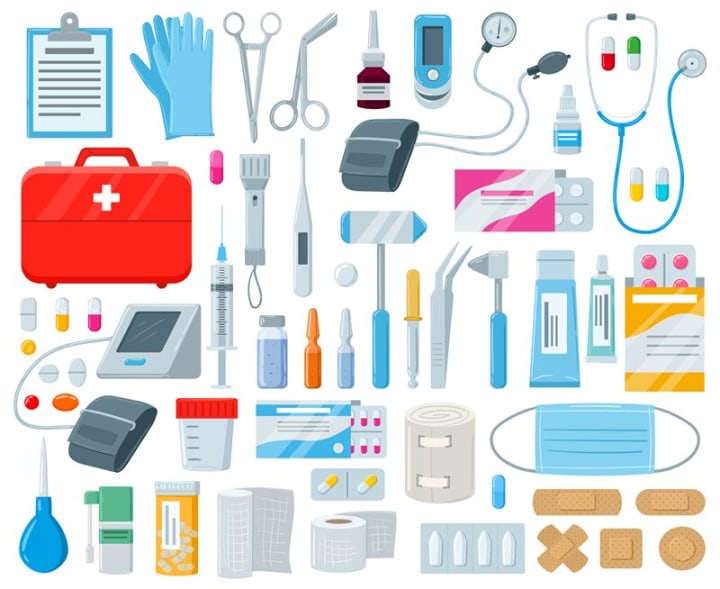Essential Emergency Medications
A Comprehensive Guide for Every Home

Introduction
Emergencies can strike at any moment, catching us off guard and leaving us feeling vulnerable. While it is impossible to predict every emergency, being prepared with essential medications can make a crucial difference in managing certain health conditions or providing immediate relief until professional medical help arrives. In this blog, we will explore a comprehensive list of emergency medications that every home should have. By having these medications readily available, you can enhance your preparedness for unexpected situations and ensure the well-being of yourself and your loved ones. In times of medical emergencies, having a well-prepared emergency medication list can make a significant difference in providing timely and appropriate care. This comprehensive guide aims to equip you with essential knowledge about emergency medications, their uses, and how to assemble a reliable emergency medication kit. Whether you are a medical professional, a caregiver, or an individual concerned about emergency preparedness, this blog will serve as a valuable resource.
Section 1: Understanding Emergency Medications
1) What are Emergency Medications?
2) Importance of Emergency Medication Preparedness
3) Different Categories of Emergency Medications
4) Life-Saving Medications
5) Symptom-Relief Medications
6) Allergy and Anaphylaxis Medications
7) Pain Management Medications
8) Other Essential Medications
Section 2: Assembling Your Emergency Medication Kit
1) 2.1 Evaluating Individual Needs
2) 2.2 Medication Storage and Organization
3) 2.3 Prescription Medications vs. Over-the-Counter Medications
4) 2.4 Proper Labeling and Documentation
5) 2.5 Checking Expiry Dates and Restocking

Section 3: Common Emergency Medications and Their Uses
1) 3.1 Epinephrine Auto-Injectors (EpiPens) for Anaphylaxis
2) 3.2 Aspirin for Cardiac Emergencies
3) 3.3 Nitroglycerin for Chest Pain
4) 3.4 Naloxone for Opioid Overdose
5) 3.5 Albuterol Inhaler for Asthma Attacks
6) 3.6 Oral Glucose Gel for Hypoglycemia
7) 3.7 Antiemetics for Nausea and Vomiting
8) 3.8 Benzodiazepines for Seizures
9) 3.9 Antibiotics for Infections
10) 3.10 Local Anesthetics for Dental Emergencies
Section 4: Tips for Using Emergency Medications Safely
1) 4.1 Understanding Proper Dosage and Administration
2) 4.2 Recognizing Potential Side Effects and Interactions
3) 4.3 Seeking Medical Assistance after Medication Use
Section 5: First Aid Basics

1) The importance of first aid in emergency situations.
2) Essential first aid supplies to have on hand.
3) Basic first aid techniques and when to use them.
4) Over-the-counter pain relievers and their appropriate usage.
1) Section 6: Medications for Common Emergencies
2) Allergic Reactions and Anaphylaxis:
a) Antihistamines for mild allergic reactions.
b) Epinephrine auto-injector for severe allergic reactions and anaphylaxis.
3) Respiratory Emergencies:
a) Inhalers for asthma and chronic obstructive pulmonary disease (COPD).
b) Nebulizers for severe respiratory distress.
4) Cardiovascular Emergencies:
a) Aspirin for suspected heart attacks.
b) Nitroglycerin for chest pain associated with angina.
5) Diabetic Emergencies:
a) Glucose tablets or gel for hypoglycemia.
b) Insulin for diabetic emergencies.
Section 7: Pain and Fever Relief
1) Nonsteroidal anti-inflammatory drugs (NSAIDs) for pain and fever.
2) Acetaminophen for pain relief and fever reduction.
3) Topical analgesics for localized pain.
Section 8: Digestive Emergencies
1) Antacids for heartburn and acid reflux.
2) Antiemetics for nausea and vomiting.
3) Anti-diarrheal medications for diarrhea.
Section 9: Wound Care and Infections
1) Antibiotic ointments for minor cuts and wounds.
2) Antiseptics for wound cleaning.
3) Hydrocortisone cream for allergic reactions and skin irritations.
Section 10: Miscellaneous Medications
1) Medications for motion sickness.
2) Antihistamines for insect bites and stings.
3) Over-the-counter sleep aids for insomnia.
Conclusion
Preparing for emergencies involves more than just stocking up on canned food and flashlights. Having a well-stocked emergency medication kit can be lifesaving in critical situations. This comprehensive guide has outlined the essential emergency medications for your home, covering a wide range of common emergencies. Remember to store these medications in a cool, dry place, and regularly check their expiration dates to ensure their efficacy. Additionally, it is crucial to familiarize yourself with the proper usage and potential side effects of each medication.
While having these emergency medications on hand can be invaluable, it is essential to remember that they are not substitutes for professional medical care. Always seek immediate medical attention for severe emergencies or if symptoms persist or worsen. By combining preparedness with knowledge and prompt action, you can become better equipped to handle unexpected situations and protect the health and well-being of yourself and your loved ones.
About the Creator
Muazzam shahzad
I am a prolific writer and passionate blogger, consistently delivering compelling content that captivates readers and resonates with a wide audience.






Comments
There are no comments for this story
Be the first to respond and start the conversation.